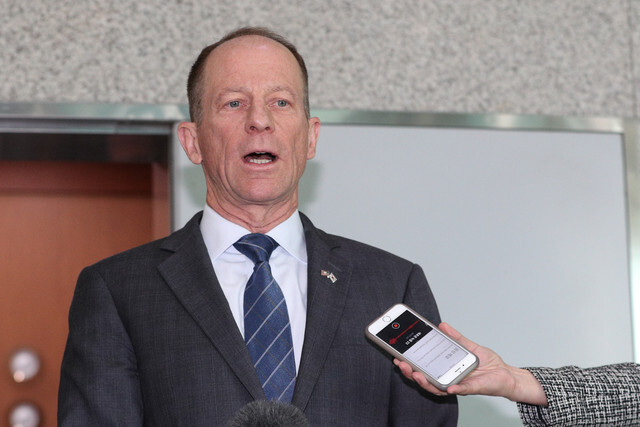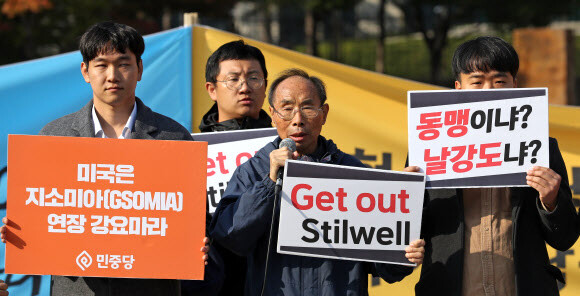hankyoreh
Links to other country sites 다른 나라 사이트 링크
[Editorial] US contradicting itself by pressuring S. Korea to extend GSOMIA

As we approach the termination of South Korea and Japan’s GSOMIA military intelligence-sharing agreement, scheduled for Nov. 23, the US is exerting intense pressure on South Korea to reverse its decision to terminate the agreement. But the decision to terminate was a reluctant countermeasure taken by the South Korean government against Japan’s economic retribution. The US is contradicting itself when it claims it has no intention of intervening in the South Korea-Japan conflict only to take issue with South Korea’s GSOMIA termination. If the US is truly concerned about the agreement being scrapped, the first thing it ought to do is push Japan to retract the economic retribution that drove South Korea to make that decision in the first place.
During his visit to South Korea, David Stilwell, US assistant secretary of state for East Asian and Pacific affairs, reportedly communicated Washington’s desire for GSOMIA’s extension during meetings with a wide range of South Korean officials from the Blue House, Defense Ministry, and Foreign Ministry on Nov. 6. When asked by a reporter how the GSOMIA talks went, Stilwell said that he had “fantastic discussions,” hinting that he asked South Korea to reverse its decision to terminate the agreement.
In recent weeks, the US has been exerting pressure on GSOMIA from multiple directions. During an interview with the Japanese press this past weekend, Marc Knapper, US deputy assistant secretary of state for Korea and Japan, called for a swift solution to GSOMIA, which he described as an important tool for cooperation among South Korea, Japan, and the US. But Knapper also dismissed the option of the US mediating between the two sides. While he didn’t explicitly call out South Korea, emphasizing the importance of GSOMIA without taking any action behind the scenes basically amounts to pressure on South Korea.
Joseph Young, chargé d’affaires ad interim at the US Embassy to Tokyo, didn’t even bother hiding the fact that South Korea is the target. According to Young, the US is clearly communicating to the South Korean government that terminating GSOMIA will have a negative impact on the US’ national interest. But such a close-minded approach won’t help solve the problem.

Some conservative South Korean newspapers have run reports suggesting that terminating GSOMIA will have a serious and immediate impact on national security, but those reports appear to misrepresent the facts. GSOMIA was concluded in November 2016. If the lack of the agreement poses such a huge threat to security, South Korea’s national security must have been in an incredibly perilous state before the agreement was signed. South Korean Defense Minister Jeong Kyeong-doo himself testified before the National Assembly back in August that GSOMIA’s military utility isn’t that high. It could be argued that even trivial military intelligence is better than nothing, but that’s no reason to blow this out of proportion.
GSOMIA’s symbolic value within the framework of the South Korea-US alliance is undeniable. But that’s a matter to be resolved separately through bilateral talks between South Korea and the US. On Nov. 6, Liberty Korea Party leader Hwang Kyo-ahn said that GSOMIA is the “biggest sacrificial victim of the Blue House and the ruling party’s campaign to save Cho Kuk.” Setting aside doubts about the veracity of that claim, it’s astonishing to see Hwang exploit national security issues as a tool for his political schemes.
No decent solution can be found to GSOMIA if we forget that Japan was the cause of South Korea’s decision to terminate the agreement. It was Japan that linked historical disputes, such as compensation for victims of forced labor, to current affairs and economic issues. It was also Japan that cited national security concerns as the rationale for the retaliatory trade measures it took in July. Logically speaking, does it make sense to swap military secrets with a country that has raised such security concerns? The solution to this problem will be found not through the US putting absurd pressure on South Korea but through Japan rescinding its trade retribution.
Please direct comments or questions to [english@hani.co.kr]
Editorial・opinion
![[Editorial] Penalties for airing allegations against Korea’s first lady endanger free press [Editorial] Penalties for airing allegations against Korea’s first lady endanger free press](https://flexible.img.hani.co.kr/flexible/normal/500/300/imgdb/original/2024/0502/1817146398095106.jpg) [Editorial] Penalties for airing allegations against Korea’s first lady endanger free press
[Editorial] Penalties for airing allegations against Korea’s first lady endanger free press![[Editorial] Yoon must halt procurement of SM-3 interceptor missiles [Editorial] Yoon must halt procurement of SM-3 interceptor missiles](https://flexible.img.hani.co.kr/flexible/normal/500/300/imgdb/child/2024/0501/17145495551605_1717145495195344.jpg) [Editorial] Yoon must halt procurement of SM-3 interceptor missiles
[Editorial] Yoon must halt procurement of SM-3 interceptor missiles- [Guest essay] Maybe Korea’s rapid population decline is an opportunity, not a crisis
- [Column] Can Yoon steer diplomacy with Russia, China back on track?
- [Column] Season 2 of special prosecutor probe may be coming to Korea soon
- [Column] Park Geun-hye déjà vu in Yoon Suk-yeol
- [Editorial] New weight of N. Korea’s nuclear threats makes dialogue all the more urgent
- [Guest essay] The real reason Korea’s new right wants to dub Rhee a founding father
- [Column] ‘Choson’: Is it time we start referring to N. Korea in its own terms?
- [Editorial] Japan’s rewriting of history with Korea has gone too far
Most viewed articles
- 1Months and months of overdue wages are pushing migrant workers in Korea into debt
- 2[Editorial] Penalties for airing allegations against Korea’s first lady endanger free press
- 3Trump asks why US would defend Korea, hints at hiking Seoul’s defense cost burden
- 4Bills for Itaewon crush inquiry, special counsel probe into Marine’s death pass National Assembly
- 560% of young Koreans see no need to have kids after marriage
- 6Korean firms cut costs, work overtime amid global economic uncertainties
- 7[Guest essay] Maybe Korea’s rapid population decline is an opportunity, not a crisis
- 81 in 3 S. Korean security experts support nuclear armament, CSIS finds
- 9S. Korea discusses participation in defense development with AUKUS alliance
- 10[Reporter’s notebook] In Min’s world, she’s the artist — and NewJeans is her art